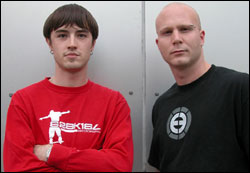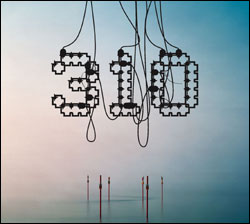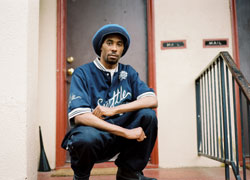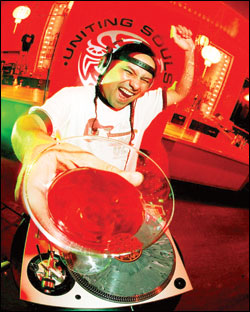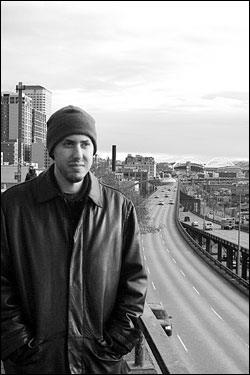“A DRUM AND BASS party’s energy is like no otherit’s raw,” says the 360 BPM DJ crew’s founder, DJ Zacharia, amidst the basement haze of his colleague DJ Nitsuj’s Capitol Hill production studio. After seven years of spreading Skippy-thick layers of bass across Northwest eardrums that hum well into the next day, it’s a feeling he knows better than most. Watch those locked in the tantrums of one of 360’s sets,whether they’re a fist-pumper, a head-bobber, a half-stepper, or frantically pacing to each of the hyperspeed rhythms the crew dish out to their loyal fans, and the untainted focus and collective synchronicity of not having another thought in the world come clear.
The punk rock of club sounds, drum and bass bum’s rushed Seattle’s dance scene with a rabidly loyal following in the mid-’90s, and 360 were there with the sole night in the city dedicated to the sound. Consisting of DJs Zacharia (né Zach Herman), Nitsuj (Justin Carr), Maxx (Max Ridnel), and Theory (Brian Rauschenbach) by day, the crew came together at Vinylized under the management of Marcus Lalario and would eventually lay the foundation for Northwest movement. Today, only Zacharia still officially spins under the 360 BPM tag, but the scene they kick started together stands as the strongest on the West Coast. “Seattle’s a perfect city for it,” Theory offers as to why it still thrives here while falling off sharply elsewhere. “It’s just got that grimy feel.”
Though drum and bass casts a wide netartists from jazz to hip-hop to rock have tried their hand at itthe “grimy,” street-level vibe sewing up the sound descends directly from early ’90s U.K. breakbeat hardcore, along with dancehall ragga bass lines and roughneck MCs. 360’s members come from similarly intense musical backgrounds. Zacharia dropped his duties as a lead singer and guitarist of a hardcore band in favor of the early rave scene, quickly gravitating to jungle’s vigorous rhythms. Nitsuj recounts a similar story, trading his bass, amp, and role in a punk band for a pair of Technics. Theory came at it from hip-hop, which he’d passionately collected for years before finding a dance scene connection to jeep beats and rhymes. And Maxx . . . well, OK, Maxx was a model. But his U.K. citizenship bought street cred backed by the facts that he’d joined the breakbeat resistance in London long before the records jumped the Atlantic, and he was originally the only one in the crew who knew the scene’s history and how to mix jungle.
For four years, the words “360 BPM” anchored every major rave flyer in the Northwestfrom 20-person basement house parties to 1,000-plus rave rooms, you’ll be hard pressed to find a beat-head from Portland to Vancouver who hasn’t come under their influence. When asked what split the crew, the answer comes immediately. “Egos,” Zacharia and Nitsuj say in unison. “We spent four and a half years working every day,” Nitsuj adds. “Living together, working together, playing together. And after a while it’s like, ‘I need space.'”
FUELED BY A ferociously competitive culture that ranked DJs by who slammed the hardest, most freshly pressed vinyl (or “dub plates”), drum and bass spiraled into a battle for bragging rights through tracks that seethed testosterone. 360 steamed into the train wreck without skipping a beat. “I’m always for the dark stuff, and I’ll always tend to go that direction,” Zacharia mentioned a couple years back. “If you can’t hang with the dark stuff, then you shouldn’t be there at all.”
The blowup was predictably ugly, but now is a different story. “It’s not like it used to be,” Nitsuj says of 360 and the scene’s retreat to its original underground footing, “but I’m more focused when I’m up there now. It’s weirdI thought I knew a lot before, but I didn’t really know anything.”
With Maxx back in England and Theory concentrating on old-school hip-hop and his artist management company, Graylife, Zacharia and Nitsuj’s current DJ sets show a more humbled, professional maturity. “I definitely don’t play as hard as I used to consistently [from beginning to end of a set],” Zacharia admits, though that’s tough to believe unless you’d seen him strain NAF’s stacks in the past. “I’ve learned to play the crowd, as opposed to three years ago when I was just playing the new records that I wanted to hear.”
It’s his last claim that’s most important, the line of demarcation between memorable DJs and an uninspired face with a box of white labels: If you’re going to drop someone else’s beats for a living, you’d better bring something of your own to the table. The tight-knit family vibe of 360’s high-octane anniversary parties hit this dead on.
360 BPM’s Seven-Year anniversary show features Friction, Slantooth, Demo, Nitsuj, Zacharia, and MC Dino. Call 206-600-6015 for more information.
